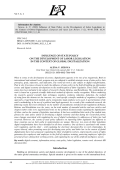When it comes to the development of society, digitalization appears to be one of its megatrends. Both on international and national levels, program acts are adopted to establish strategic areas of state policy, their principles, goals, objectives, and indicators. The world of work is also subject to digital transformation. That is why it becomes relevant to study the influence of state policy in the field of building an information society and digital economy development on the modernization of labor legislation. Three EAEU member states have been included in the subject of research: Russia, Belarus, and Kazakhstan. The methodology of work is based on a general scientific dialectical method of objective reality recognition. When conducting the research, general scientific logic techniques (analysis, synthesis, induction, deduction, the method of rising from the abstract to the concrete, etc.) and specific scientific methods of cognition (a legalistic approach, a legal historical method, and a comparative-legal analysis) were used. A special feature of the work’s methodology is the use of a political and legal approach. As a result of the conducted research, the following results have been obtained: on the number of amendments introduced into legislations of Russia, Belarus, and Kazakhstan over the years; on the total number of amended articles and new articles and chapters labor codes were supplemented with; on the political decisions made regarding the digitalization of labor, and on the content of legislative innovations. It has been established that each of the studied state pursues the state policy aimed at developing a digital economy and that during the researched period, some changes associated with regulating the use of digital technologies by addressees of labor law had occurred. However, the extents of state policy influence on improving labor legislation are different in these countries, just as their paths to modernization are unique. However, two areas of labor legislation digital transformation have been identified in all three countries. One of them is associated with remote work regulation, and the other - with regulating the electronic document flow in work relationships. In respect thereof, other promising areas for developing state policy and labor law in the context of global digitalization have been proposed: regulating the labor of platform workers, improving the system of rights guarantees for employees and employers in the field of employee training, protecting employees’ rights for personal privacy during their working activity, and regulating the use of the artificial intelligence system.
Развитие цифровой экономики способствует удовлетворению потребностей общества и государства в обеспечении законности и правопорядка посредством использования цифровых технологий для создания и реализации норм трудового права. В статье проведен анализ семантического значения понятия «машиночитаемое и машиноисполняемое трудовое право», проблем и перспектив его развития. При этом особое внимание обращается на такие понятия, как искусственный интеллект, электронный документооборот в сфере трудовых отношений. Автор статьи отмечает, что трудовое законодательство содержит недостатки в сфере понятийного аппарата, а также иные дефекты, например: недостатки, противоречия, несовершенство трудоправовых норм и трудоправовых конструкций, которые приводят к проблемам правоприменения, нарушению трудовых прав и законных интересов субъектов трудовых и иных непосредственно связанных с ними отношений.

